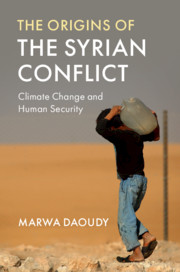4 - Rules of Ideology and Policy
From Ba’athism to the Liberal Age
from II - Human–Environmental–Climate Security (HECS)
Published online by Cambridge University Press: 05 March 2020
Summary
Chapter 4 analyzes the political dimension of the HECS framework in the context of Syria, contending that ideology played a key role in creating Syria’s vulnerabilities in the lead-up to the uprising. The chapter focuses on two key ideologies – Ba’athism in the 1970s and neoliberalism in the early 2000s – and their economic and agricultural policies. The Ba’athist regime under Hafez al-Assad effectively securitized food production to justify agricultural reforms designed to maintain the support of rural agrarian constitutiencies. The author shows that these Ba’athist policies, which included intensive irrigation, food and fuel subsidies, and large-scale hydroprojects, led to unsustainable water and agricultural practices and poor governance. Finally, the chapter examines the liberalizing reforms under Bashar al-Assad, which culminated in a 2005 shift to a social market economy, and concludes that they increased the vulnerability.
Keywords
- Type
- Chapter
- Information
- The Origins of the Syrian ConflictClimate Change and Human Security, pp. 103 - 149Publisher: Cambridge University PressPrint publication year: 2020

